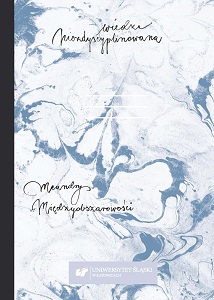


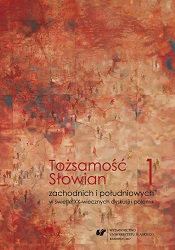
Keywords: Drago Jančar’s essay writing; Terra incognita; Slovenian identity; the role of the Slovenian language
Drago Jančar is one of the most prolific and frequently translated contemporary Slovenian writers. He is a prosaist, an author of short stories and novels, a playwright and a multiple award-winning essayist. As an essayist, he always responded to the current questionsabout the historical role of Slovenians in former Yugoslavia, in the context of Central Europe,in the times of Slovenian independence and those of entering the European Union. Jančar’s word always drew a lot of attention and initiated polemical responses. This paper discusses his essay-writing in relation to the forementioned problems.
More...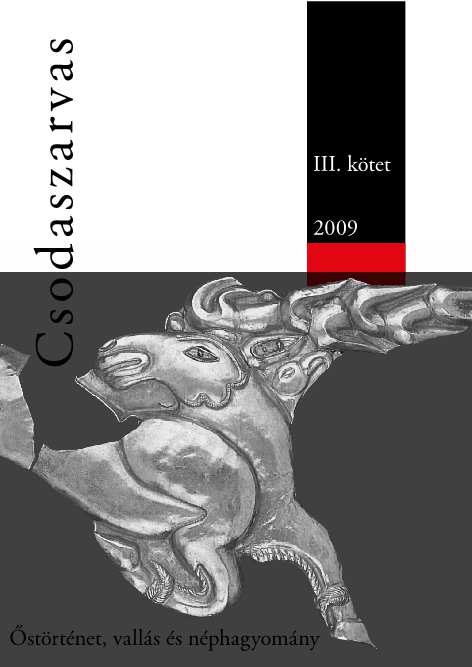
The paper analyses two image cycles representing the life and miracles of St. Ladislas, king of Hungary (1077–1095). One of them, the Hungarian Angevin Legendary (ca. 1330) represents the saint's life in twenty-four images. The image cycle is partially based on the written legend, however some of the scenes follow the text of the Hungarian Chronicle. The other pictorial source is the Illuminated Chronicle (Chronicon Pictum, ca. 1360). The chapter describing the deeds of Ladislas is illustrated with seventeen miniatures. This cycle emphasizes the miraculous events more than the political acts and includes supernatural elements not described in the text. Thus, the illustrations of the chronicle and the legendary moved towards an ideal compromise between the secular and the religious character of Ladislas, creating an extremely influential ideal, athleta patriae, an important propaganda tool for the legitimacy of the Hungarian Angevin dynasty.
More...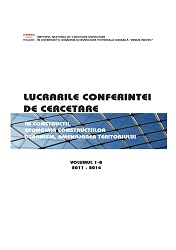
Keywords: industry; crime; economic growth; urban integration
The paper was developed to illustrate how problems arising with the process of urbanization that characterized the middle of the twentieth century, led to the emergence of new types of housing and urban landscape, favelas. Developing for over a century, this phenomenon spread throughout Latin America, creating new problems for the city of Rio de Janeiro which aspires to the status of global city and will be the host of two major international events: Football World Cup 2014 Olympic Summer Games 2016. City crisis caused by economic factors, extreme poverty and criminal practices developed within favelas led government and municipalities to launch projects for integrating these communities into the city, Brazil becoming a role model for other Latin countries.
More...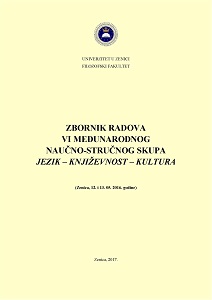
Keywords: social transition; Bosnian-Herzegovinian society; educatio;, educational perspectives;
Changes in socio-economic and political relations inevitably imply changes in education. This paper discusses the reflections of social transition to the educational system in Bosnia and Herzegovina. The transformation of education in transition countries on the principles of Western European, democratic and civic education is particularly thematised in socio-cultural context of transitional problems and educational perspectives in Bosnia and Herzegovina. Bosnian-Herzegovinian society is experiencing a deep crisis. Education is at the centre of social problems, where it becomes a factor of social promotion, rather than a means of social change
More...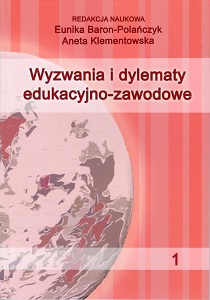
Keywords: ageing of societies; the elderly; self-development; active life; post-productive period;
The article presents the problem of the progressive ageing of societies, which highly developed countries have been tackling already since the mid-20th century. The author describes the way elderly people are perceived by the rest of society and the possibility of rendering aid and support to them by their closest environment and by public institutions. The most important needs and expectations of the elderly have also been listed. Attention has been drawn to the need of self-development throughout one’s lifetime, not excluding old age, and to the growing necessity to lead an active life in one’s post-productive period.
More...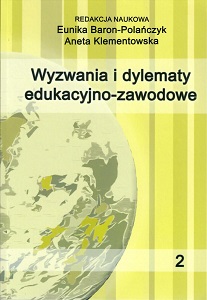
Keywords: old age;ageing;activating the senior citizens; educational activity; professional activity;
The article has been an attempt at demonstrating how important it is to consider the OAPs getting involved in educational and professional activity and how much strongly it is connected with getting adapted to the old age. According to the concept of activity, the activity is a condition of the emotional balance of an individual, it is a value appreciated by the society and it assumes taking up the activity considering the strength and the potential of the individual. With that in mind, educational and professional activity of the people aged fifty plus assumes various forms depending on the personal preferences and predisposition, or attitudes as well as the life itself before reaching the old age. They are also determined by many various factors the sources of which must be searched for in external factors. The analyses presented are theoretical and empirical in nature. The theoretical part of the article covers the importance of senior citizens being active in terms of getting adapted to the old age and successful ageing as well as educational and professional activity of senior citizens, as compared with other types of activity and its significance in active participation in social life by the elderly as reported in the applicable literature. Theoretical considerations have been extended with the analysis of selected results of own research reported by the author into taking up educational and professional activity by senior-age people in the Kujawy and Pomorze Province.
More...
Keywords: E-Government; ICT (Information and Communication Technology); Digital Storage;
Lehtësia e përdorimit të informacionit, të teknologjisë së komunikimit dhe prania e tyre e gjerë, kanë sjell për çdo ditë një sasi të madhe të të dhënave dixhitale që krijohen në sektorët publik dhe privat. Prania e gjerë e qeverisjes elektronike dhe përdorimi në rritje i komunikimit dixhital, në botën e zhvilluar e shton këtë gjë edhe më tepër. Këto të dhëna jo vetëm që paraqesin dëshmi për proceset, hapat dhe vendimet e marra nga administrata publike, por ato janë edhe një burim informacioni për brezat që vijnë dhe për studimet e tyre rreth së kaluarës. Jo vetëm që këto të dhëna dixhitale duhet të jenë në dispozicion, por ato duhet të jenë të gjetëshme, të shikueshme dhe të prezantueshme, si dhe të besueshme dhe autentike.
More...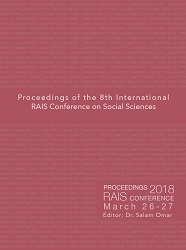
Keywords: hermal Performance; Building Envelope; Thermal Comfort, Public Primary Schools; Lagos Metropolis
Limited research has been carried out on school buildings in Africa, especially for children below the age of 11. The aim of this research was to assess the thermal performance of the building envelopes of selected public school classrooms in Lagos Metropolis, in order to have an assessment of the impact of thermal performance (measurement of the environmental factors) on pupils’ comfort. A two stage method of sampling was used; a purposive method to select 5 samples from each of the 6 educational districts in Lagos and then random selection of schools. Questionnaires were administered to 5 pupils per school. Subjective and objective measurements were carried out according to class II field experiment method and in consonance with ASHRAE’s (American Society of Heating, Refrigerating and Air-Conditioning, Engineers) standards. Results showed that classrooms on the mainland had a significantly higher performance than those on the Island. Recommendations were made for future provisions of classroom designs to be suited to the microclimate of their locations and tailored towards the enhancement of activities at the hottest periods of the day and year, and no single design template should be adopted for use on various sites.
More...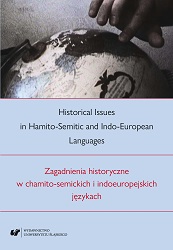
Keywords: regional and social dialects; variation; variety; pronunciation; American English
The purpose of this article is to present variation in American English pronunciation with respect to such factors as region, sex, age, social status, style, and context. We will select a few variables and analyze them in terms of their possible realizations – so called variants or candidates. With regard to the occurrence of variant realizations of a particular variable, it is crucial to stress that our analysis is not solely linguistically-conditioned since it also encompasses social and contextual factors which definitely contribute to the variation. The analysis from the purely linguistic point of view would be either erroneous or at least incomplete and thus unreliable. Therefore, the variation will be analyzed linguistically, socially, and contextually. We will observe the occurrence of at least two (or more) variants of particular variables (linguistically) and analyze their evaluationas prestigious or substandard (socially, contextually). In other words, we will indicate that with the emergence of the variants, one cannot avoid making judgments about the alleged betterness or worseness of either of them.
More...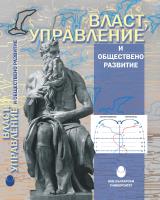
Keywords: Quadruple spiral; Innovation; Social integration; Risk groups; Regional innovation system
This report explores the opportunities for a Quadruple Helix Approach where business, public sector, research/ academic centers and civil society organizations interact to accelerate the transfer of innovative social welfare solutions in regional chains. It analyzes the historical perspective and outlines the roles of the participants, creating and exchanging innovative practices for the social integration of the risk groups. Because of personal observations, participation in discussions, workshops and projects, the author presents summarized results of Bulgarian practices and provides guidance for strengthening cooperation in the regional innovation system.
More...
Keywords: Recreation; City tourism; Trends; Opportunities; Perspectives; Management; Strategies
The report will reveal the opportunities for urban tourism, links and relations between creation and demand of entertainment services to help tourism development in cities as attractive tourist destinations through tour operator, hotel and restaurant products, transport accessibility and use of entertainment in urban environment. The trends, approaches and possible alternatives in the modern development of urban tourism, the entertainment industry and the need to offer new and different products will be outlined.It will be proven the thesis that tourism industry enables to satisfy tourist desires and needs, touch their searches and provoke their interests and experiences, by appropriately combining management strategies that will be part of the main goal and mission of the city management policies.
More...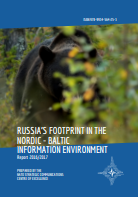
Keywords: Russia; Baltic States; Finland; Sweden; narratives; public opinion; information; NB8; Sputnik; RT; Perviy kanal;
The study of Russian narratives regarding the NB8 countries identified the most common ‘outgoing’ narratives used in 2016. However, mere content analysis is not a sufficient metric to assess Russia’s influence in the information environment, because media is just an instrument for reaching the ultimate target—the cognitive dimension of the communities that reside in the NB8 countries. Therefore the final ingredient in this study of Russia’s activities in the information environment of the NB8 region for the period 2016–2017 was a comparative public opinion survey that aimed to discover to what extent the narratives promoted by Russia correspond with the views of the societies in the region. It should be emphasized that measuring Russia’s influence in information environment is a complicated task. Four issues limit the possibility of arriving at comprehensive and unambiguous answers by means of a limited quantitative survey: 1) there are no strict divisions between the narratives promoted by Russia and the views of opinion leaders and societies outside Russia—they may coincide without any specific connection to Russia; 2) without qualitative research methods it is impossible to know how the respondents understand such concepts as ‘neo-Nazism’, ‘threat’, ‘destabilization’, etc., and if their understanding differs from the interpretation assumed in the Russian narratives; 3) without additional research it is also impossible to draw any conclusions about the factors influencing of the opinions of respondents, therefore coincidence in views can not necessarily be interpreted as due to Russia’s influence or, indeed, as the absence of it; 4) additional research is necessary to determine how Russia seeks to match its narratives to the attitudes present in the NB8 societies to advance its strategic goals, and, indeed, if this is possible. Nevertheless, an initial attempt was made to measure the spread of the narratives promoted by Russia in the NB8 region in terms of public agreement or disagreement with the ideas that are in line with the content produced by Russian state-funded media and Russia’s strategic goals. Although the survey data should primarily be taken as a basis for further research, the results provide a valuable comparative perspective on public opinion in the NB8 region and the extent of the use of the three Russian state funded media outlets surveyed. The data obtained in this pilot study supports a more sceptical view regarding Russia’s informational influence on Western societies as expressed by prominent Russian expert M. Galeotti: ‘Too much is often made of the alleged influence of the English-language Sputnik news agency and RT television channel, or even of the online trolling and disinformation campaign. Evidence that they actually changed minds—rather than just pandered to existing prejudices—is still lacking.
More...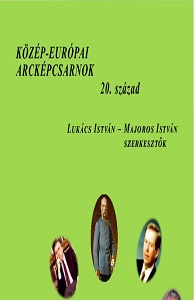
Keywords: Zionism; Herzl; Diaspora Nationalism; Yiddishism; Agudath Israel; Or-todox Judaism;
Nathan Birnbaum was a remarkable figure in the Jewish political life of the Austro–Hungarian Monarchy and beyond. He played a very import-ant role in all the major Eastern European Jewish political movements. He was acknowledged not only as one of the founders of the Zionism but also as a major figure of the Jewish politics and thought.His life had three main phases, representing a progression in his think-ing: a Zionist phase (1882 – 1899); a Jewish cultural autonomy phase (1900 – 1914) which included the organization of the first Yiddish langua-ge conference in Czernowitz; and last period of his life (1915–1937) when he turned to Orthodox Judaism.
More...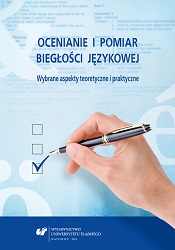
Keywords: Latin; grammar-translation model; evaluation; socio-linguistic context; characteristics of ancient languages; logical thinking; language skills
The characteristics of Latin as an ancient language significantly limit the application of methods used in teaching modern languages. The grammar-translation model has, so far, yielded the best results in teaching Latin at the university level, which, in turn, requires the evaluation methods used during the course to reflect that model and the language skills developed in this particular way. Other methods are significantly less effective and should be used only to introduce variety and render the learning process more appealing. The study of Latin is virtually completely devoid of the elements emphasized in the study of modern languages, which, in turn, necessitates the changes in evaluation, in order to take into account the range of the evaluated skills.
More...
Keywords: Central Europe; economic relations; new nations states; Masaryk; Beneš;
Hantos’ ideas contained progressive elements and made a realistic of-fer to the states of Central Europe. Its timing was unfortunate, however, because the new nation states’ desire for separation made its realization more difficult. Also, Germany’s breakthrough, and its new network of bi-lateral economic relations made virtually impossible the alliance of the Central European countries. Other attempts at integration have emerged too which also weakened the process. Hantos’ recognition, and offer of freedom from old grudges was a viable alternative to the weary nations of Central Europe. Elemér Hantos was a precursor of the spirit seeking the possible ways of coexistence, and no longer just for Central Europe, but for the whole of Europe: to emphasize what unites us, not what separates us.
More...
Keywords: Ferenc Erdei; agrarian lobby; knowledge transfer; Hungary; socialism; Revolution of 1956;
This paper focuses on a person being both a scientist and a politician who played a key role in socialist Hungary in the initiation of the opening towards the West. Ferenc Erdei (1910–1971) started his career as a soci-ologist in the early 1930s and was mainly involved in politics after 1945. Following the revolution in 1956, he drew back from his active political role. He established the Research Institute of Agricultural Economics of the Hungarian Academy of Sciences which became the the most import-ant background institution of the Agrarian Lobby. My paper argues that the experience Erdei gained from his study trips in Western Europe in the 1930s served later as a basis for the „bridge-building” between the socialist East and the capitalist West. In my paper I investigate which western countries Erdei launched the opening towards and through which channels he started to build a network as well as the political and professional debates that followed this process.
More...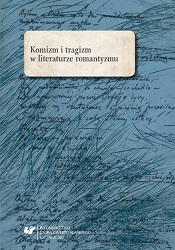
According to Mikhail Bakhtin, in Romanticism the ludic element of the mask blurs. The mask gains a number of new meanings, at the same time losing its associations with rebirth, characteristic of folk culture, and acquiring a new, gloomy expression. This article traces this gloomy and tragic aspect of masquerades as presented in Romanic literature. The analysis is based on three texts: Mikhail Lermontov’s Masquerade, Juliusz Słowacki’s Jan Bielecki and Antoni Malczewski’s Maria. The motif of masquerade, present in all three works, is discussed both from the perspective of the theory of literature and with reference to the cultural contexts of the mask.
More...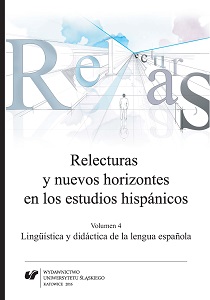
Keywords: intercultural competence; Spanish as a Foreign Language; language abilities
The purpose of this article is to present different activities which will aid Polish students who learn Spanish as well as for their teachers who will obtain an efficient tool to test the language abilities of their students. Furthermore, the activities will demonstrate cultural differences based on the student’s ethnographic attitude. All these activities which we offer are focused on the intercultural competence which should be an integral part of the educational process. In addition, the authors of the proposals give consideration to the notion of culture according to Geert Hofstede and his model of dimensions, which they analyse and describe comparing Spanish and Polish languages.
More...